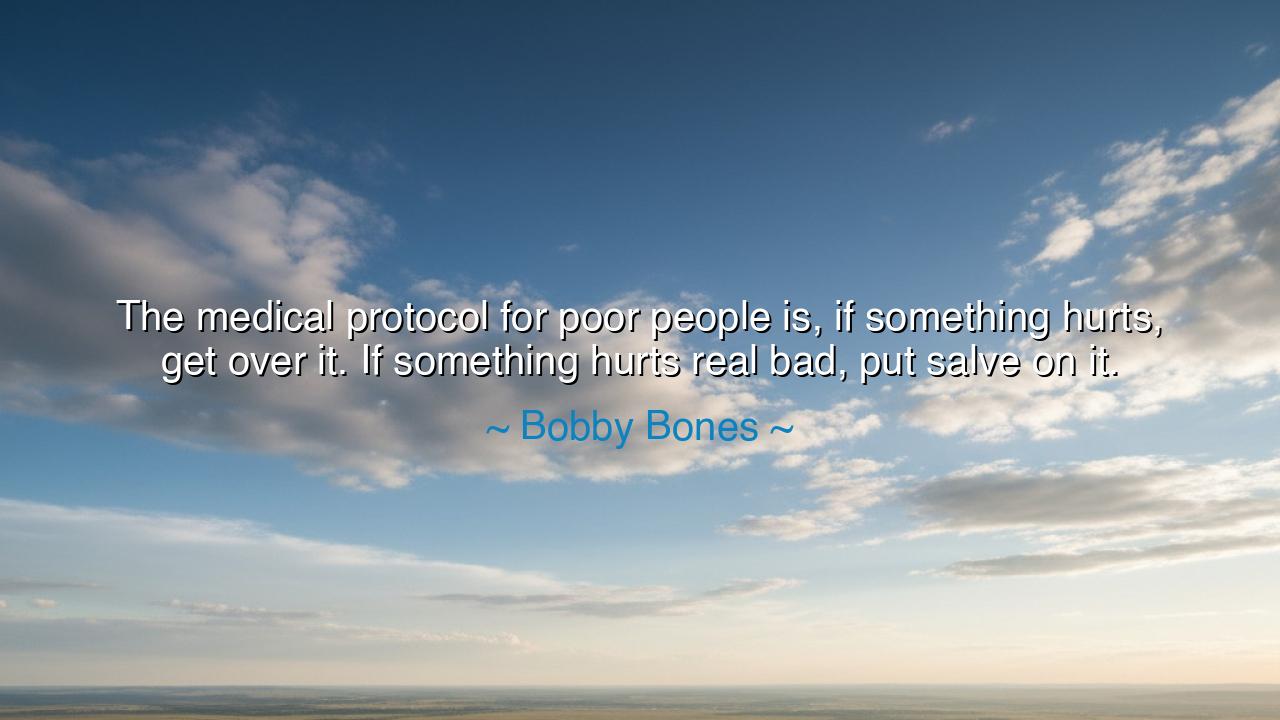
The medical protocol for poor people is, if something hurts, get
The medical protocol for poor people is, if something hurts, get over it. If something hurts real bad, put salve on it.






"The medical protocol for poor people is, if something hurts, get over it. If something hurts real bad, put salve on it." These words from Bobby Bones strike at the heart of an uncomfortable truth: in many parts of the world, healthcare is not a universal right but a privilege. For the poor, the path to healing often involves not expert care or attention, but a lack of proper treatment and reliance on simple remedies that mask symptoms without addressing the root causes. Bones’ stark description reveals the disparity between those who have access to advanced medical care and those who must endure suffering, often ignored by a system that should be dedicated to their well-being.
In ancient times, societies were built on a hierarchical structure, where access to knowledge and medicine was determined by one’s position in society. The Egyptians, with their advanced understanding of medicine, reserved their finest healers and remedies for the elite, while the poor relied on herbalists and untrained healers for relief. The Greeks, too, divided their understanding of the body and healing, with Hippocrates, often called the father of modern medicine, offering insight into medical practices that were not always available to the common folk. In both cases, the wealthy had the best access to healing, while the poor were left to suffer, sometimes relying on superstitions or rudimentary care.
This historical inequity in healthcare persists today, as Bones’ statement so aptly highlights. Just as in ancient times, modern society often separates the privileged from the disenfranchised in the realm of healthcare. The medical protocol for the poor, as Bones describes it, is often a matter of survival, with little concern for comprehensive care. Many families struggle with medical costs, and without adequate insurance or financial resources, they are left with no choice but to endure pain and discomfort. Salve, in this context, becomes a metaphor for the temporary fixes that are often applied when the root of the problem cannot be addressed.
One poignant example of this can be found in the story of Dr. Paul Farmer, a physician and anthropologist who dedicated his life to providing healthcare to the poor in places like Haiti. Dr. Farmer recognized that poverty is a primary determinant of poor health, and he fought to provide not just temporary fixes but long-term care to those who were denied it by the broader medical system. Dr. Farmer’s work sheds light on the stark contrast between the salve offered to the poor and the true healing that could occur if everyone had access to the care they needed. The lesson here is that we must not accept temporary fixes for the poor but strive to create a system where healing is not determined by wealth but by need.
Bones’ quote also brings to mind the struggles faced by Florence Nightingale in the 19th century. Nightingale, a nurse and social reformer, sought to improve healthcare conditions for the poor in hospitals, particularly during the Crimean War. She recognized the inequities in healthcare, where soldiers and civilians alike suffered needlessly due to poor sanitation and lack of proper medical care. Her work in reforming the healthcare system laid the foundation for modern nursing, but it also highlighted a grim truth: access to quality healthcare was often denied to the poor and underserved, much as it is today. The salve that was applied in the form of quick fixes or inadequate treatment only worsened the cycle of suffering and poverty.
The lesson here is not just about medical treatment, but about the broader implications of a society that prioritizes the wealthy over the vulnerable. The real healing comes when we stop applying salves—temporary solutions—and begin to address the root causes of the problem. Healthcare must be viewed not as a privilege, but as a fundamental right. Just as Hippocrates sought to understand the root causes of illness and focused on prevention, so too must we focus on creating a system that provides for the health of all, regardless of income or status. Temporary fixes, such as salves, do not heal; they only hide the wound.
In our own lives, we must challenge the assumptions that Bones’ quote exposes. Let us not be content with the status quo, where the poor continue to suffer without adequate care. We must advocate for a healthcare system that provides equitable access to all—one where the privileged few do not dominate the discourse, and where equality in health is prioritized. Whether we are citizens, healthcare providers, or policymakers, we have the responsibility to ensure that healing is not reserved for the wealthy, but accessible to all. Let us, like Dr. Farmer and Florence Nightingale, take action to change the system, providing true healing for those who need it most. Let us not accept the salves of today but work for the true healing that a just society demands.






AAdministratorAdministrator
Welcome, honored guests. Please leave a comment, we will respond soon